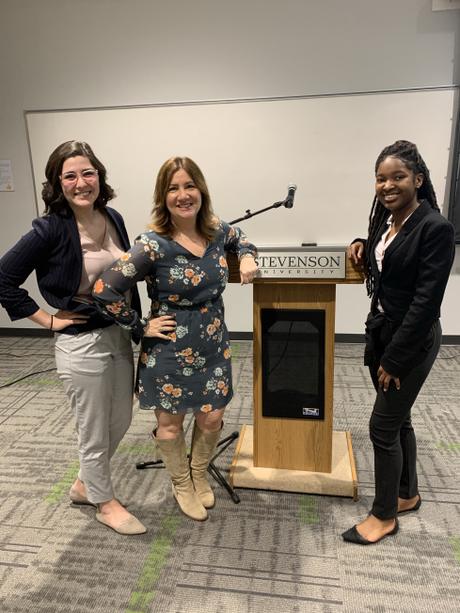 My two students, Kacie (l) and Chalisee (r) presented their advertising campaigns at our Paul D. Lack Scholars Showcase before we moved to online learning. I am so glad they had the opportunity to do this before the move to remote learning.
My two students, Kacie (l) and Chalisee (r) presented their advertising campaigns at our Paul D. Lack Scholars Showcase before we moved to online learning. I am so glad they had the opportunity to do this before the move to remote learning.
A few months ago, no one could have predicted the serious state we would be in as the coronavirus affects the world. I looked back at my camera roll this morning, and it’s filled with photos of local travel, time with friends and family, writing and promoting my books, and all the love I feel when I am on Stevenson’s campus. Now, as we are all quarantining ourselves to help flatten the curve, it looks as if this will be the new normal for some time.
At Stevenson University, we took action quickly. We convened, came up with a plan to finish out the semester, and have put that plan into action. My fellow Fellows and I organized a session to share ideas as we—traditional faculty—transition to online learning. Our university has done a wonderful job of putting resources into place to help us all with this move to remote learning.
I have taught online classes before. As well, I earned my MFA from National University through an online-only program. Therefore, I can speak from experience at having earned two master’s degrees in two different ways. The first master’s I earned was a degree in Professional Writing from Towson University, and my courses took place in a traditional, in-person classroom setting. The second degree I earned was from National University (out of San Diego, California), and the entire program was online. I loved being a student in both programs. And they both served me differently at different points in my life.
While taking my master’s courses at Towson, I worked full-time at the Baltimore Orioles. I could only take one class a semester because of my grueling work schedule. It took me four years, as opposed to two, to earn that degree. When I was hired as a full-time faculty member in Business Communication at Stevenson University, I went back to school to earn a terminal degree—an MFA in Creative Writing. At that time in my life, I was working full-time, teaching a full load of courses and working at my degree in the evenings at the computer. I had two small children and a husband. Remote learning was what worked for me at the time.
Moving toward online learning for the rest of the semester has its perks—it allows students to dive into the material without commuting, oversleeping, or having classes interfere with extracurricular activities and sports. Students can hone in on the work for the next eight weeks. Faculty have worked hard over the last week to develop courses for online delivery, and to have the classes suit the students. I have already prepared several lectures that are posted to our online Blackboard site for students to review at their convenience; I have also noted when assignments will be due and have tried to provide a structure. We’re all doing the best we can.
When I took online classes through National University, they were very structured, and I got into a groove. Sometimes I scratch my head wondering how I taught and graded my own classes, raised my kids, tended to our family’s needs, wrote a novel as my thesis, and earned that online MFA. Not only did I do it, but I did it well. I ended up with a pretty stellar GPA while juggling all of these responsibilities. I’m not saying this to brag, although I was pretty proud of myself, but rather to show that it can be done, despite my aforementioned responsibilities and the amount of work and reading and writing it required.

So, if you are someone who is moving to online classes for the rest of the semester, here are my 10 tips to help you soar.
- Structure your days. Be regimented. Know when you will be working at your computer or reading or writing, and don’t make excuses and procrastinate.
- Take control of your own learning. Don’t skip things because it’s easy; be prepared to do the hard work it takes to LEARN what it is the class is teaching you.
- Take breaks as needed. Stretch, take a walk, get a healthy snack. Clear the mind as necessary, especially as you move from one subject to another.
- Plot EVERYTHING on a calendar and work backward from the due dates. Pencil in when you will read, when you will write, when you will turn in your work to meet deadlines.
- Remember—your teachers are there for you. If you find yourself struggling, reach out to the professor. In remote learning, it’s always important to keep the lines of communication open.
- You are responsible for the learning—don’t be afraid to be curious and ask questions. Dive in and explore.
- As you will be juggling several classes, it’s important to make time for each class. Try to allow time to be an active learner in each class you are taking to get the most out of the next eight weeks.
- Remind your family that you are still in “school.” If you need to find a space in your house that works best for you to accomplish your work, come to an agreement that you get that space for specified hours of the day.
- Be flexible: you and your professors are navigating new territory with having to reboot halfway through the semester. Be patient. Be kind to yourself.
- Just do the best you can, so that at the end you can be proud of your efforts.
*

Stephanie Verni is Professor of Communication at Stevenson University. She has authored five works of fiction and one academic text on Event Planning. Her character-driven books are set in beautiful Maryland locations and examine the realities of the human heart. Connect with her on Instagram at stephanie.verni or on Twitter at @stephverni. Or, visit her Amazon page at Stephanie Verni, Author.

